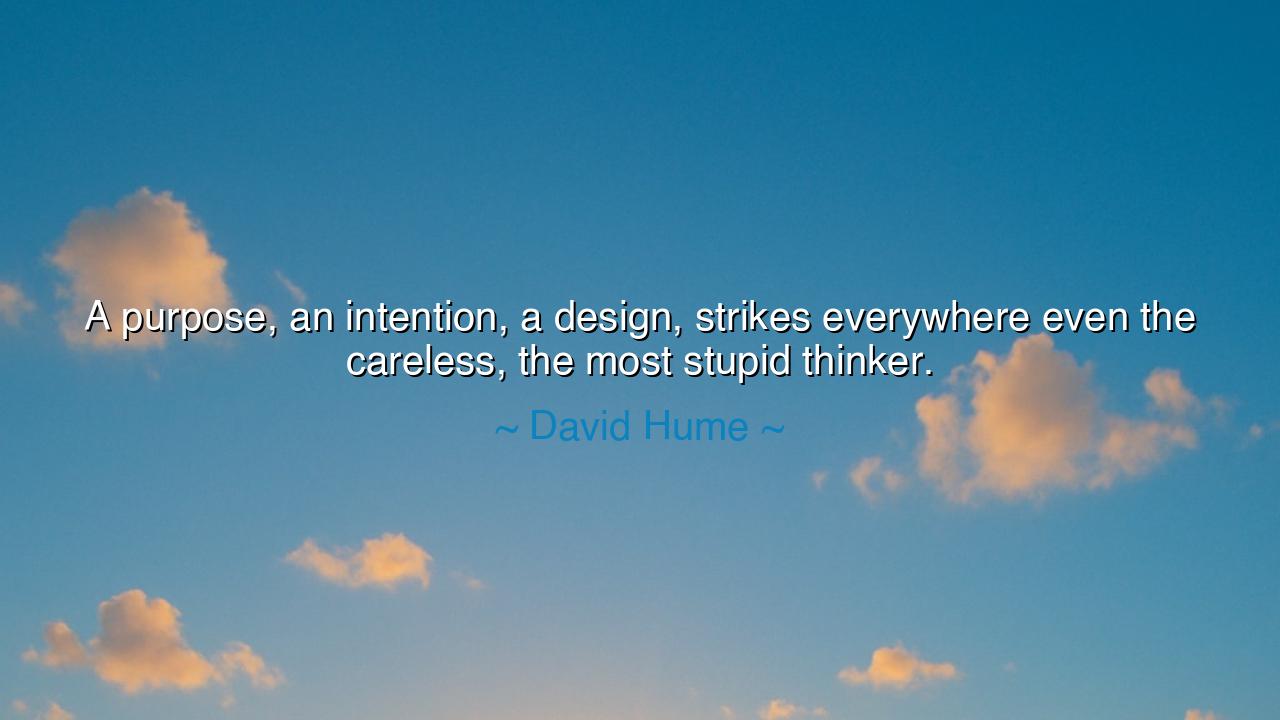
A purpose, an intention, a design, strikes everywhere even the
A purpose, an intention, a design, strikes everywhere even the careless, the most stupid thinker.






The philosopher David Hume, that calm yet thunderous voice of the Enlightenment, once wrote: “A purpose, an intention, a design, strikes everywhere even the careless, the most stupid thinker.” These words, born from the contemplation of nature and reason, shine like a lantern in the vast darkness of human understanding. Hume, the great skeptic, was not merely speaking of theology or philosophy — he was uncovering something far older and deeper: that within every soul, no matter how untrained or unwise, there stirs an instinct to see order, to feel purpose, to believe that behind the endless motion of the world lies design.
In every sunrise and storm, in the fall of leaves and the birth of stars, man perceives intention. It is as if the universe itself whispers meaning into his heart, and he cannot help but listen. Even the dullest mind, even the most distracted spirit, senses that there is something more, some pattern beyond the random noise of life. Hume saw this not as superstition, but as the natural inclination of the human soul — that to live without seeing purpose is to be blind to one’s own existence. The farmer who plants his seed trusts in the rhythm of the seasons; the mother who teaches her child feels the forward pull of destiny. In each of us, whether philosopher or peasant, there dwells a faint yet unyielding awareness that design surrounds us.
To understand Hume’s thought, one must recall the age in which he lived — a time when reason wrestled with faith, when man began to question the gods but still yearned for meaning. The Enlightenment brought light, yet even in that brilliance, Hume perceived that reason alone could not silence the human heart’s desire for purpose. The universe, he said, may or may not bear the mark of a creator, yet it appears so intricately ordered that even the simplest observer cannot deny the appearance of intention. Like a watch whose gears turn in harmony, the world moves with precision too perfect to seem accidental. Thus, even those who mock philosophy, who never study or pray, cannot help but bow — silently, unknowingly — before the mystery of design.
Consider the story of Isaac Newton, who gazed into the heavens and saw not chaos, but divine mathematics. When he discovered the law of gravity, he did not claim to invent truth, but to uncover it — as though the universe had been written long before, waiting for a mind to read it. Newton’s work was reason incarnate, yet his awe was spiritual. He saw in every motion of the planets a purpose, a cosmic order that defied chance. His discoveries moved mankind forward, yet his reverence reminded us that knowledge itself is an act of faith — faith in the idea that the world is not meaningless, that it is structured, intelligible, deliberate.
And so it is in our own lives. Even when confusion reigns, when plans crumble, when the future feels void, something deep within us whispers of intention. We sense that we are not drifting aimlessly, that there is a pattern we cannot yet perceive. Hume’s wisdom urges us to look for this hidden design — not to invent meaning where none exists, but to recognize that meaning often reveals itself only to those who endure, who observe, who listen. The careless man may stumble upon purpose without knowing it, but the wise man learns to see it in all things.
The great truth is this: Purpose is not confined to the grand or the divine — it breathes in every act, every moment. To speak kindly is purpose. To build something that lasts is purpose. To suffer and yet continue is purpose. The universe may not whisper in words, but it speaks in the quiet rhythm of growth, decay, and renewal. When we align ourselves with that rhythm, we become part of its design.
So, my child of the future, when doubt clouds your vision, when the world seems senseless and empty, remember the words of Hume. Look again — there is purpose everywhere. Even in chaos, there are traces of order. Even in pain, there are seeds of creation. Trust that the universe, vast and ancient though it is, moves with intention, and that your life, though small by comparison, is woven into that same eternal tapestry.
Let this be your lesson: seek purpose not in distant heavens, but in the work of your hands, the thoughts of your mind, the love you give to others. For even the “most careless, the most stupid thinker,” as Hume wrote, cannot escape the truth that design surrounds him — and if he looks inward, he will find that it also lives within him.






AAdministratorAdministrator
Welcome, honored guests. Please leave a comment, we will respond soon